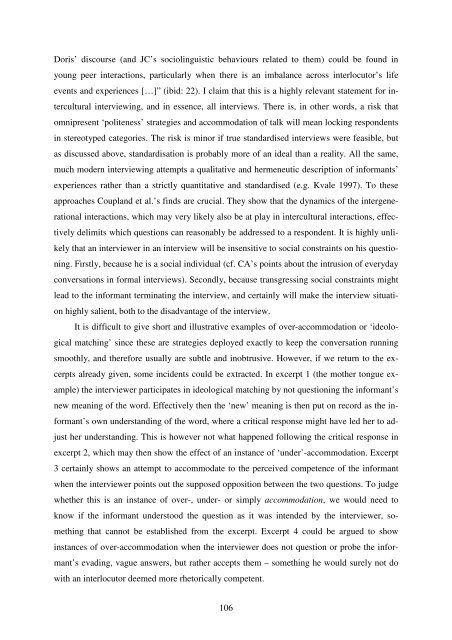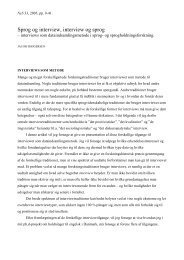Hør dog hvad de siger - Note-to-Self: Trials & Errors
Hør dog hvad de siger - Note-to-Self: Trials & Errors
Hør dog hvad de siger - Note-to-Self: Trials & Errors
You also want an ePaper? Increase the reach of your titles
YUMPU automatically turns print PDFs into web optimized ePapers that Google loves.
Doris’ discourse (and JC’s sociolinguistic behaviours related <strong>to</strong> them) could be found in<br />
young peer interactions, particularly when there is an imbalance across interlocu<strong>to</strong>r’s life<br />
events and experiences […]” (ibid: 22). I claim that this is a highly relevant statement for in-<br />
tercultural interviewing, and in essence, all interviews. There is, in other words, a risk that<br />
omnipresent ‘politeness’ strategies and accommodation of talk will mean locking respon<strong>de</strong>nts<br />
in stereotyped categories. The risk is minor if true standardised interviews were feasible, but<br />
as discussed above, standardisation is probably more of an i<strong>de</strong>al than a reality. All the same,<br />
much mo<strong>de</strong>rn interviewing attempts a qualitative and hermeneutic <strong>de</strong>scription of informants’<br />
experiences rather than a strictly quantitative and standardised (e.g. Kvale 1997). To these<br />
approaches Coupland et al.’s finds are crucial. They show that the dynamics of the intergene-<br />
rational interactions, which may very likely also be at play in intercultural interactions, effec-<br />
tively <strong>de</strong>limits which questions can reasonably be addressed <strong>to</strong> a respon<strong>de</strong>nt. It is highly unli-<br />
kely that an interviewer in an interview will be insensitive <strong>to</strong> social constraints on his questio-<br />
ning. Firstly, because he is a social individual (cf. CA’s points about the intrusion of everyday<br />
conversations in formal interviews). Secondly, because transgressing social constraints might<br />
lead <strong>to</strong> the informant terminating the interview, and certainly will make the interview situati-<br />
on highly salient, both <strong>to</strong> the disadvantage of the interview.<br />
It is difficult <strong>to</strong> give short and illustrative examples of over-accommodation or ‘i<strong>de</strong>olo-<br />
gical matching’ since these are strategies <strong>de</strong>ployed exactly <strong>to</strong> keep the conversation running<br />
smoothly, and therefore usually are subtle and inobtrusive. However, if we return <strong>to</strong> the ex-<br />
cerpts already given, some inci<strong>de</strong>nts could be extracted. In excerpt 1 (the mother <strong>to</strong>ngue ex-<br />
ample) the interviewer participates in i<strong>de</strong>ological matching by not questioning the informant’s<br />
new meaning of the word. Effectively then the ‘new’ meaning is then put on record as the in-<br />
formant’s own un<strong>de</strong>rstanding of the word, where a critical response might have led her <strong>to</strong> ad-<br />
just her un<strong>de</strong>rstanding. This is however not what happened following the critical response in<br />
excerpt 2, which may then show the effect of an instance of ‘un<strong>de</strong>r’-accommodation. Excerpt<br />
3 certainly shows an attempt <strong>to</strong> accommodate <strong>to</strong> the perceived competence of the informant<br />
when the interviewer points out the supposed opposition between the two questions. To judge<br />
whether this is an instance of over-, un<strong>de</strong>r- or simply accommodation, we would need <strong>to</strong><br />
know if the informant un<strong>de</strong>rs<strong>to</strong>od the question as it was inten<strong>de</strong>d by the interviewer, so-<br />
mething that cannot be established from the excerpt. Excerpt 4 could be argued <strong>to</strong> show<br />
instances of over-accommodation when the interviewer does not question or probe the infor-<br />
mant’s evading, vague answers, but rather accepts them – something he would surely not do<br />
with an interlocu<strong>to</strong>r <strong>de</strong>emed more rhe<strong>to</strong>rically competent.<br />
106



